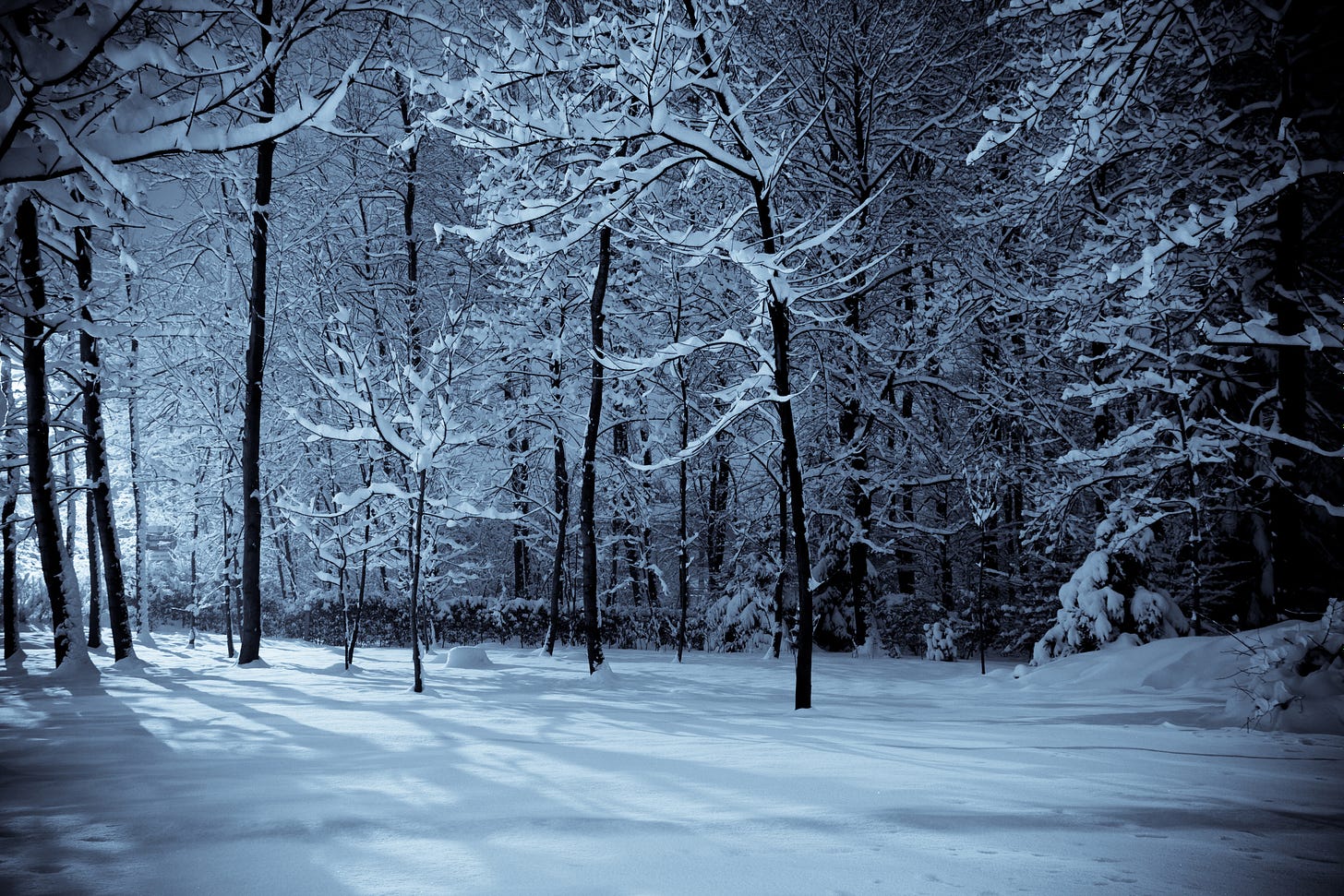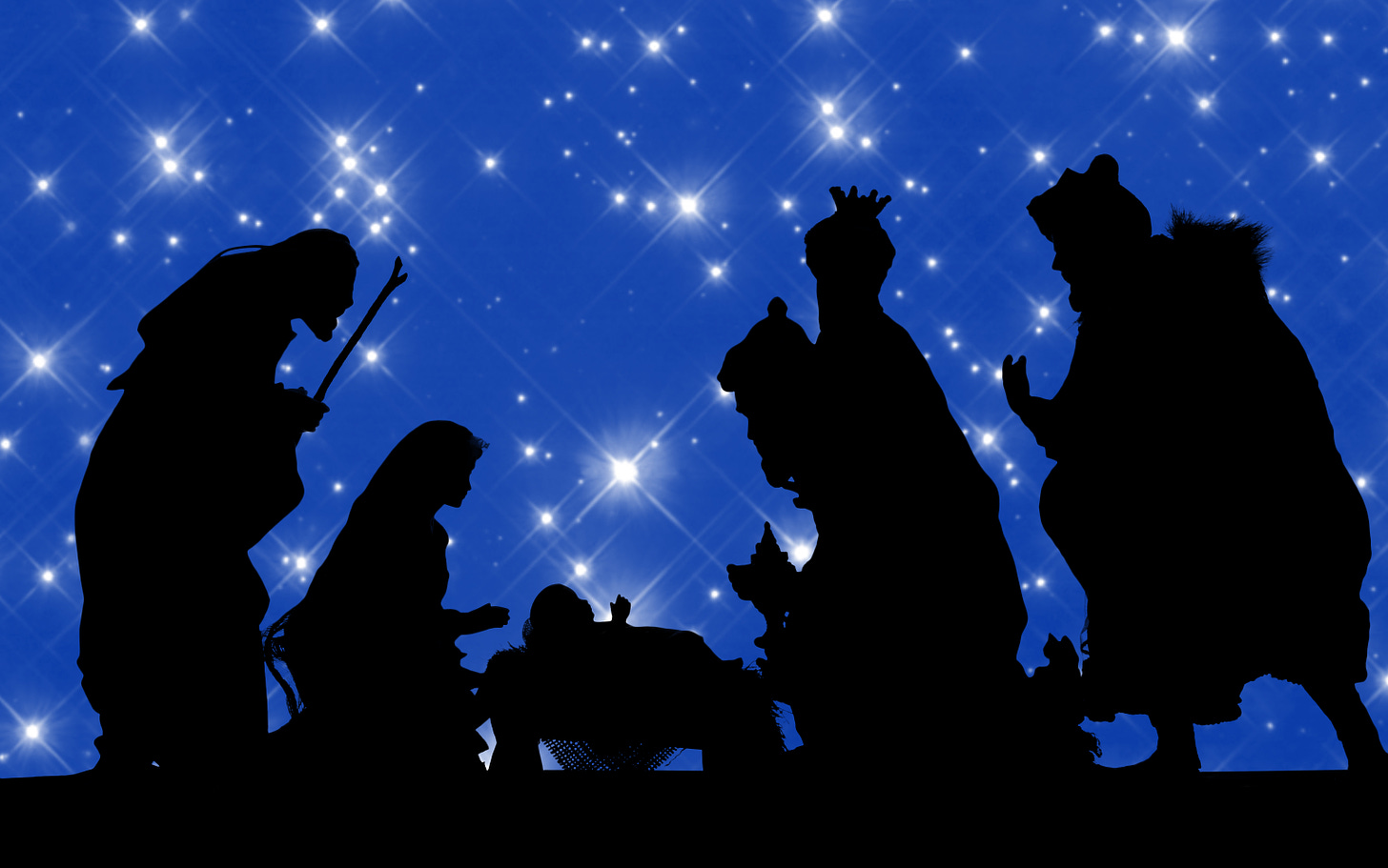On January 5, the eve of Epiphany, I went for a night walk. We’d just had a big snowstorm in Virginia. The trees were still encased and frozen a silvery white, their branches sparkled in the moonlight against a deep blue sky. Everything was silent; the only sound was the cracking crust of hardened snow with each footfall. I wondered: Is this what it is like to dance across the stars?
And that is what Epiphany is — a season of stars. Magic.
Of course, in more conventional use, Epiphany is a season in the Christian year — the weeks that follow Christmas until Ash Wednesday and the beginning of Lent. In the northern hemisphere, it is the deep winter season, a time of starkness, cold, ice, and snow. Madeleine L’Engle once wrote that winter “reveals structure,” that which is behind the riot of leaf and flower of spring. Stripped down to the icy branches, Epiphany manifests a January spirituality helping us see what we cannot otherwise see.
Epiphany is not just a liturgical placeholder between two important Christian holy days. It may well be the most undervalued — and, in many ways, the most contemporarily relevant — season of the Christian year.
The traditional themes of Epiphany are light, glory, sight, revelation, and enlightenment. The seasonal cycle begins with the story of the Magi — three wise mystics — following a star, a journey that takes them to Jesus, God’s promise birthed into the world, wonder embodied as a tiny child. The most ordinary of human moments — birth — becomes extraordinary.
Epiphany is about seeing the extraordinary in the everyday. Some Christians call Epiphany “ordinary time,” but there’s nothing ordinary about it. Week after week, with each story presented in the yearly lectionary, what seems ordinary is revealed as something extraordinary. A baptism turns into a divine announcement; water becomes wine; reading holy words introduces a prophet of the Kingdom; a day’s laborious fishing breaks the nets with a great catch; the poor are blessed; and love, mercy, and forgiveness are offered not to friends but to those who seek to do us harm.
Epiphany is a cracking of the ice underfoot. The frozen world starts giving way to something else — the branches sparkle in the moonlight, a star leads to a barn, the beauty of the deep structure of things is revealed. We begin to wonder: Maybe every baptism announces God’s love. Maybe water always has been wine. Maybe we are all prophets of liberation. Maybe every day’s work holds abundance. The poor and sad and persecuted have always been the blessed. Perhaps we are always dancing on the stars and just don’t notice. Not until an epiphany. It is far more than a day. It isn’t just the “weeks following” Christmas or the Magi visit. This is the season of extraordinary time, the in-breaking of creation’s promise. This Epiphany, this seeing, this glory of the cosmos manifested here and now.
Indeed, Epiphany is best expressed through paint and poetry and imprecise preaching; it is the delight of theologians of imagination and children playing in snow. I suspect that is why it is largely ignored by those who have lost the sense that faith is magical and that miracles are real. But Epiphany is real. And you know it is real because of a single, powerful, and relevant truth: each of its miracles is met by a violent counterforce bent on extinguishing the extraordinary.
The Magi’s visit is followed by Herod’s infanticide. Jesus’ baptism happens in conjunction with John’s arrest. The miracle of water and wine is followed by an angry encounter with religious profiteers. Proclamation of the Kingdom results in a mob attempting to throw the prophet off a cliff. The great catch of fish causes the disciples to abandon their families and jobs. Blessings are followed by woes. And the call for mercy and forgiveness is countered with vicious rumors and the hatching of a plot to do away with Jesus.
This extraordinary season induces awe. It reveals that there is more to the world than what we accept as “ordinary.” And there are powers and principalities that will press against Epiphany with fear and great violence. To see the deep structure, to follow the star, to hear the breaking of the ice encasing the earth is threatening to those who benefit from “normal,” the accepted veneer of “ordinary” injustices and oppressions and indignities that bedevil and deceive the human race.
And thus: Epiphany is the season we need now. We need its clarity, its sharp starkness. Maybe our moment in history is an epiphany — the ordinary is being pulled back to reveal that which has been hidden from view. The mundane is charged with meaning — and epiphanies are everywhere. It is as if the universe has cracked open with truth — and terror. We live in awful and awe-filled times. For some of what we know as ordinary has become the gateway to glory; and some of what we’ve accepted as ordinary is only another guise of vainglory. It takes an epiphany to reveal which is which — to know the deepest love in the world and live in the tailings of the star.
INSPIRATION
Epiphany
Unclench your fists
Hold out your hands.
Take mine.
Let us hold each other.
Thus is his Glory
Manifest.
— Madeleine L'Engle
The poetry of earth is never dead. This Epiphany, let us be alive to the world, the extraordinary mundane.
— A.E. Stallings
I don’t know where prayers go,
or what they do.
Do cats pray, while they sleep
half-asleep in the sun? . . .
While I was thinking this I happened to be standing
just outside my door, with my notebook open,
which is the way I begin every morning.
Then a wren in the privet began to sing.
He was positively drenched in enthusiasm,
I don’t know why. . .
But I thought, of the wren’s singing, what could this be
if it isn’t a prayer?
So I just listened, my pen in the air.
— Mary Oliver
St. John tells how, at Cana's wedding feast,
The water-pots poured wine in such amount
That by his sober count
There were a hundred gallons at the least.
It made no earthly sense, unless to show
How whatsoever love elects to bless
Brims to a sweet excess
That can without depletion overflow.
Which is to say that what love sees is true;
That this world's fullness is not made but found.
Life hungers to abound
And pour its plenty out for such as you.
Now, if your loves will lend an ear to mine,
I toast you both, good son and dear new daughter.
May you not lack for water,
And may that water smack of Cana's wine.
— Richard Wilbur
A REMINDER for PAID SUBSCRIBERS:
January 13 at 8PM Eastern/5PM Pacific is the next LIVE ZOOM to the Cottage. We’ll be talking about Epiphany, pandemic, and insurrection. We’ll have an amazing guest to explore these themes — musician Ken Medema. I’ve been lucky enough to work with Ken at conferences through the years and he’s a treasured friend. I wanted to talk with him about Epiphany and “seeing” for a very particular reason: Ken was born blind. I absolutely know he will have real insight for us in these challenging days. And we might even get him to encourage us with a song.
THE LINK WILL BE SENT OUT AT 5PM EASTERN (three hours in advance) on THURSDAY JANUARY 13 to everyone on the paid subscriber list.
As always, if you want to join in the paid list and can’t afford it, just send us an email (by replying to this email as you would any email) and let us know a little about your situation. No one is ever turned away for lack of funds.
Hope to see you there! If you can’t come, we’ll record it and send it out the next day.





Wow…just wow!!! Deeper and more appreciative than thank you expresses.
Wow, this is so beautiful. I didn't know about the Cottage a year ago and so I am just reading this today. Thank you for the link to this in your writing today. I have never paid attention to Epiphany - didn't even know what it was before this year. It is a new enlightenment for me and this writing has a brought me to a deeper thinking and feeling about how this part of the year is important. When I read your excerpt, I immediately looked to see who wrote it because it was the most beautiful piece on the page. I will print this and sit with it and enjoy the beauty you have given us! Thank you!